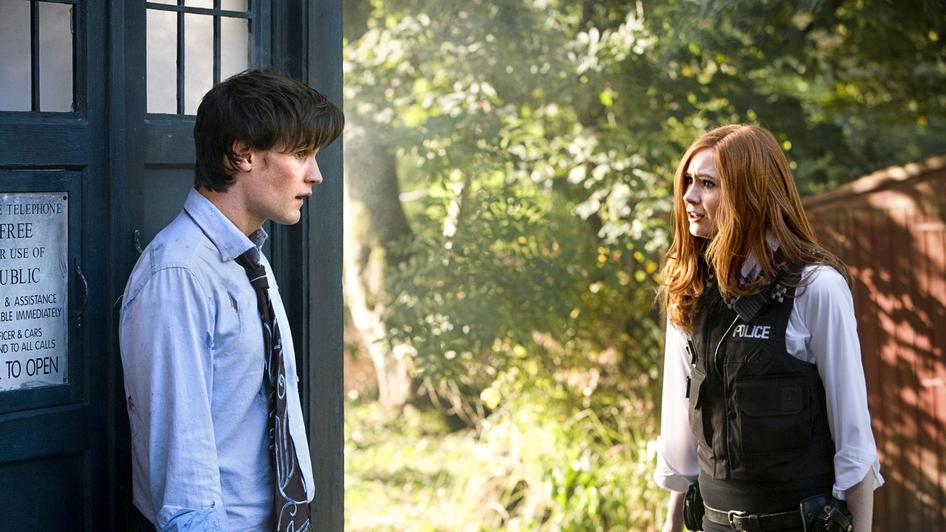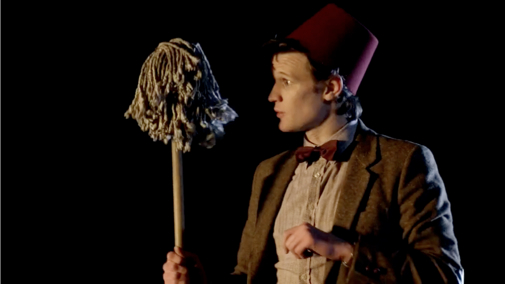Mentioning Mr. Smith at the conclusion of Part I makes me ponder the differences between the three doctors since the resurrection. All of them were and are marvelous, all for different reasons.
Christopher Eccleston, a rugged, intense actor who could play big-budget movie supervillains, Jude the Obscure opposite Kate Winslet, and the most modern of troubled men in Our Friends in the North, was a great 9th Doctor, interpreting his character as that of the loneliest battle-scarred man in the world, a condition magnified by his Spartan ensemble of a leather jacket and all black clothing. The 9th Doctor’s whole modus operandi, in my opinion, was that he wanted to put the recent past behind him in some way despite thinking it was impossible: in his attempt to forget the horrors of war, he sought out adventure, excitement, and eventually when he didn’t think it would hurt his heart, friendship and love, and embraced them a little too eagerly but always with brio. And when he found all of the above in his travels with Rose Tyler, Season 27 was the story of a man coming back to life.
But then came David Tennant.
Tennant, as the 10th Doctor, is the greatest actor to ever play the role and arguably the greatest Doctor ever. Tennant loved the show as much as Davies and Moffat, and he brought the mix of Baker’s eccentricity, McCoy’s almost sinister mysteriousness and overwhelming power, and McGann’s romanticism to its height because, more than any other Doctor—and this is absolutely correct because the Doctor has lived for 900-plus years and has in theory seen and known it all, albeit not knowing every room in the universe—he could change his demeanor on a dime, adjusting the different aspects of the Doctor’s personality to his audience, be hilarious one minute, angry the next, and loving a few minutes later. And Tennant could make an audience feel with him: beyond the horror of “The Waters of Mars,” I think of the aching loneliness at the end of “Doomsday,” the goofy abandon of “The Unicorn and the Wasp,” the final desperation in “The End of Time,” and above all, his confrontation with the beast in “The Satan Pit,” an expression of love and faith in the most certain of poetic terms. Tennant took me on a non-stop carousel on a rollercoaster car, and we should all be grateful for the experience.
I also have a giant fondness for Matt Smith as the 11th Doctor. I love his zest, his power to deliver a great one-liner (of which the 11th as many), and the sheer excitement he conveys in exploring the universe and discovering the new, something which no other Doctor has done so well. And Smith can also bring forth, in twiter parlieu, “all the feels.” The single tear at the end of “The Doctor, the Widow, and the Wardrobe,” the sign of how connected to us and how human the Doctor can be, was one of the most emotional moments in television history for me.
By the way, when I think about the post-revival Doctor Who, this is what I remember the most…
“Doesn’t that scare you to death?” (“Bad Wolf”)
“If I believe in anything…just one thing…I believe in her!” (“The Satan Pit”)
Two looks on the 10th Doctor’s face: when the Master dies in his arms during “Last of the Time Lords” and when he hears the gunshot in “The Waters of Mars.”
Amy watching the documentary on The Lone Centurion in “The Big Bang.”
The 11th Doctor’s moment of humanity in “The Doctor, the Widow, and the Wardrobe”
And also…”Twenty-seven scholars just punched the air!”
Smith was born to play the Doctor in a way the amorpohous Tennant was not necessarily born to play him. My one issue with Smith, which is not a problem but keeps him from being as great as Tennant, is that he can’t turn it off or shift the mood. Like another great doctor, Samuel Johnson, he can abstain but never moderate. He’s either ultra-emotional and dramatic or ultra-exuberant. He takes the Doctor to extremes in every scene, while Tennant knew when to dial back. But the Doctor is alien and Smith is a barrel of jacked-up monkeys with contagious enthusiasm to spare, so I never mind.
While I love the Doctors pretty equally, I can’t say the same about the companions.
Rose Tyler and Amelia Pond plus Rory Williams have gotten the most buzz, and in Amy’s case plenty of cosplay, and that’s as it should be. They are the clearest signs of how well the resurrection of Doctor Who worked. The original show’s companions were the most static of characters. These were not.
Rose went from being a lower-class shopgirl to the life of adventure she’d always craved, and it transformed her into someone who could cross universes and fight evil. And as she traveled, her friendship with the Doctor grew into love, an ultimately tragic but powerful one, whose evolution happened episode by episode in little moments, lines, looks.
Amy and Rory…I feel redundant saying much about them as so much as been said already. But in two and a half mostly fantastic seasons, Amy underwent a stunning metamorphosis, from schoolgirl with a crush on her imaginary friend to a devoted wife, mother, and working woman with a strong integrity and morality, and as the Doctor changed Amy, so they both changed Rory, a stolid, fretful stick in the mud who performed the greatest act of heroism in the show’s history (the 2000-year guarding of the Pandorica) and developed his own fondness for adventure. And more bizarrely, Amy and Rory went from being children to parental figures for the Doctor, two people who can talk human common sense to him and make decisions he cannot, as in “The Angels Take Manhattan.”
Needless to say, Billie Piper, Karen Gillan, and Arthur Darvill are terrific, especially the latter two in how they could change their physical appearance to echo their emotional development.
But my favorite companion…no one in the show’s history had the chemistry of David Tennant and Catherine Tate as the 10th Doctor and Donna Noble.
Donna was more than a match for the Doctor’s witticisms and grandeur, and her one season was one of amazing character progress. Introduced in “The Runaway Bride” as a self-centered near-harpy with a low opinion of herself, Donna’s travels made her a selfless, confident, and more than capable woman, the only human who could absorb the energy of the Gallifreyans, and she did it all in the midst of a nonstop dance of banter with the 10th Doctor, who was from beginning to end just a friend, exactly how they wanted it…
The great peril Doctor Who faces is losing its identity and becoming just another TV show. The deeper relationships between the Doctor and his companions are well-played, but at its heart the Doctor was always a best friend or father figure who could play off how his companions were opposite him. Tennant and Tate brought this quality to its apotheosis.
On that note, Catherine Tate naturally handled the comic aspects of Donna with aplomb, but it was her dramatic abilities in dark episodes like “Turn Left” which cemented her greatness. And her finale, the companion who never wanted to leave being forced to leave, was as much a heartbreaker as Amy and Rory’s.
That leaves Martha Jones. Freema Agyeman is a fine actress, but her introduction into the TARDIS was almost an afterthought, and she was given no defining emotional traits except an unrequited love for the Doctor. She didn’t have Rose’s pluck, Donna’s goofiness, or Amy’s fire…she was just there. And the writers never made as much of her as they could have despite a season in which every episode saw her step in at a crucial moment to use her brains or action to save the day in a way the Doctor couldn’t for on or another reasons. This is a shame, because Season 29 had great episodes and Martha is a rarity among TV characters: an attractive woman of science and intelligence who never becomes a sex object.
Among those great Season 29 episodes, especially the finale with John Simm as a handsome and impassioned Master, well…you know how people tell you over and over again how great something is, and you’re almost afraid to experience it because you don’t think it will live up to the hype? “Blink” lives up to the hype. As pitch-perfect as the greatest Rod Serling and Dennis Potter teleplays, “Blink” was funny, incredibly intelligent in its treatment of time travel (though from a singularly Doctor Who perspective), genuinely scary, and featured both Tennant and a then –unknown Carey Mulligan at their best. AND Steven Moffat added the Weeping Angels to the cavalcade of villains.
Every season of Doctor Who is different and has something to recommend it. Season 27, besides the 9th Doctor’s emotionally wrought storyline, included “The Empty Child/The Doctor Dances,” an ambitious, tearjerking story that managed to be as scary as “Blink” and introduce Captain Jack Harkness at the same time—a Moffat creation whom Davies would give his own show—and the overall mix proved that Doctor Who had staying power.
Season 28 was nearly perfect. David Tennant and Billie Piper kick it off in “The Christmas Invasion,” in which Tennant literally creates his interpretation of the Doctor before our eyes, and then spend the run slowly but surely falling in love with each other. The three great episodes are Moffat’s “The Girl in the Fireplace,” a star-crossed tale which takes place in the future and 18th-century France simultaneously, climaxing with a fine twist ending, and Davies’s “Army of Ghosts/Doomsday.” This one was a sci-fi fan’s wet dream, the Daleks and Cybermen battling each other and the Doctor all at once…
But it also was a stunning ending to a season with a subtle theme: in every episode, the Doctor and Rose lose each other through separation, possession, time leaps, even their own emotional barriers, and find each other again. But their shared bond leads them to carry a joke with Queen Victoria too far, and Victoria founds Torchwood, makes the Doctor their greatest enemy, and it is Torchwood’s maneuvers which tear the Doctor and Rose apart for good. Theirs was a love which only they could unwittingly destroy. What keeps Season 28 from being my favorite season—and by the way, Donna gets introduced in “The Runaway Bride” at the end and the idea of “Doctor-lite” episodes was introduced in the very funny “Love and Monsters”—is “Fear Her,” the most boring and unimaginative episode in the show’s history.
Season 30 has no standout episode until “The Stolen Earth/Journey’s End,” but it’s amazingly consistent. Everything works, every beat is hit, every joke lands, all due to the Tennant-Tate dynamic, especially the run in the middle from “The Sontaran Stratagem/The Poison Sky” to “Silence in the Library/Forest of the Dead,” which introduced that lovely enigma River Song. (This run includes “The Doctor’s Daughter,” with David Tennant’s now-wife Georgia Moffatt, daughter of 5th Doctor Peter Davison, in the title role…bizarre.)
Season 31 gets the award as the greatest Doctor Who season ever. Steven Moffat had taken over, Matt Smith was in, and their first team-up, “The Eleventh Hour,” was a perfect introduction to the series for all the new fans who had heard of the show and Tennant and wanted to see something special. In sixty minutes, Moffat displayed his gifts for suspense and humor and fully defined the 11th Doctor, Amy, and Rory with minimal exposition. Now, “The Beast Below” and “Victory of the Daleks” are mediocre, although definitely not as bad as “Fear Her,” but from this point on Moffat and his team get better and better, on a non-stop thrill ride in which a crack in the wall becomes the means for the entire fabric of time and space to become torn apart. The episodes are distinct and perfectly-paced: action-packed two-parters with the Weeping Angels and the Silurians cross paths with the mind-bending “Amy’s Choice,” “Vincent and the Doctor,” Richard Curtis’s deeply moving time-travel story about two geniuses, the Doctor and Van Gogh, meeting, and “The Lodger,” in which Matt Smith and James Corden display so much back-and-forth comic magnificence that I swear they should reboot Laurel and Hardy and give them the roles.
And “The Pandorica Opens/The Big Bang” is my favorite Doctor Who episode ever: a genuine and brutal threat, Amy and Rory’s own love story hitting an incredible high, the Doctor and River’s relationship intensifying, the Doctor in various hats taking on all his foes, and, in the final minutes, the 11th Doctor’s monologue which explains why people love Doctor Who better than I ever can…because it’s a story which is memorable, magical, and will be remembered long after it ends.
Season 32 started off just as strong, with Moffat’s thrill-ride “The Impossible Astronaut/Day of the Moon” and Neil Gaiman’s whimsical “The Doctor’s Wife,” but the duration was taken up with a bleakly depressing story concerning the Doctor’s death, Amy and Rory losing their baby, and situations designed to rip people apart in every sense. It wasn’t bad, but it was very reminiscent of the best American sci-fi of the past two decades, shows like Buffy the Vampire Slayer and Lost which mingled wit, smarts, and psychological trauma, pushed their story arcs to the brink, and found rather pat endings. I found it hard to finish Season 32 because besides the mental stress of the constant terror, it felt strained, Moffat and his writers forcing this depressing plot and mood on us. I don’t know why they felt Doctor Who needed to be like every other science-fiction or fantasy show…it may have been the sudden recognition that this show was now an international sensation…but they turned it into something you could pick up on the CW, pretty gloom and doom. That’s not Doctor Who.
But Season 33 has seemed to be a conscious choice to move away from that. Except for a recurring motif of flickering lightbulbs (small, yes, but remember what he did with a crack in the wall?) Moffat is telling elaborate but stand-alone stories reminiscent of the rollicking 60s and 70s with new menaces and new over-the-top supporting players every week, and while the Ponds are gone, “Asylum” gave a special teaser of Matt Smith and Jenna-Louise Coleman’s chemistry as two razor-edged wits in the same manner Tennant and Tate were, which is an exciting prospect.
The Doctor describes time in “Blink” as “wibbly-wobbly, timey-wimey,” non-linear and crazy and never predictable. I’ve found that trying to describe Doctor Who to people, as in this essay, is much the same way…there is SO MUCH to cover and so much to be passionate about that it defeats the linear and you get swept up in everything you want to say and feel.
Because for a sci-fi show, Doctor Who is all too down-to-earth. It celebrates humanity, the wonders we can feel, the emotions which make us delighted and sad beyond measure, and celebrates intelligence and union. Once you’ve caught the feeling, it’s hard not to love it.
And theoretically, it could never end.
I hope it doesn’t.

It’s against a lot of unwritten laws to write about Doctor Who and NOT show Tom Baker at least once.


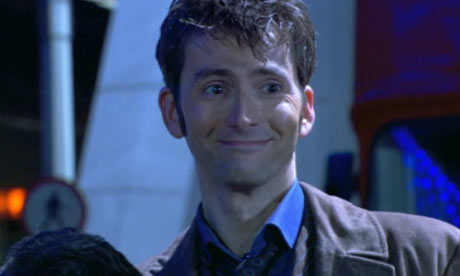





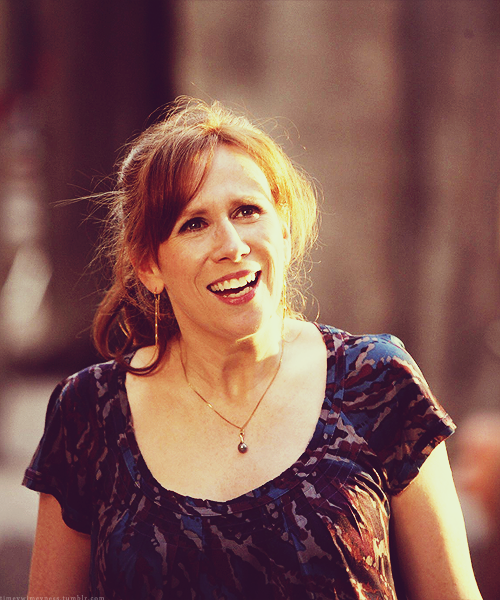
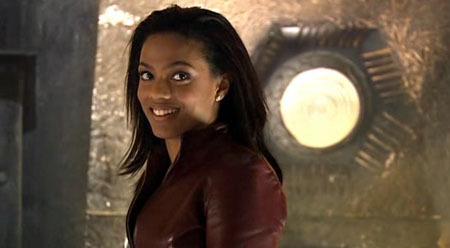
.jpg)
.jpg/275px-Doomsday_(Doctor_Who).jpg)
